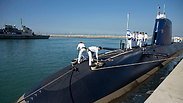


Submarine affair requires commission of inquiry
Op-ed: Regardless of the criminal aspect of the affair, a committee must be appointed to investigate the handling of defense purchases. The police should not be the ones to check, for example, how Israel reached a discreet agreement with Germany on selling weapons to Egypt.
I’m referring to six questions about the past and one question about the future. The first question is whether Prime Minister Benjamin Netanyahu planned to purchase three submarines in addition to the five that already existed and one that was on its way, and agreed only later—following pressure from Defense Minister Moshe Ya’alon—to keep the total number of submarines at six rather than nine.
The second question has to do with the decision’s timing. Assuming that the lifespan of a submarine is 30 years (it’s actually longer), the first replacement should take place in 2027. It takes about six years to build a submarine, which means the decision could have been put off till 2021. Why was it so urgent to do it earlier?

The third question has to do with the intention to buy two more ships with anti-submarine warfare (ASW). This plan was cancelled too only because the defense minister happened to hear about it and intervened.
The fourth question has to do with the strange process of the bid for boats that would defend natural gas fields from an attack, the changes made in the tender and its eventual cancellation, and the decision to select Thyssenkrupp as the only supplier despite the Defense Ministry’s objection.
The fifth question has to do with the attempt to privatize the Navy shipyard behind the IDF’s back, and the sixth and most important question has to do with the claim that the prime minister’s representative gave the Germans permission to produce similar submarines for Egypt, despite previous understandings between Germany and the Defense Ministry that this would not be done.
Even if we assume that the criminal investigation won’t lead to any charges, is there nothing to investigate here? What we have here is a series of claims about the way defense purchases are handled. Take, for example, the intention to purchase two ASW ships without informing the army. It’s as if the prime minister or his representative would travel to the United States and order two more F-15 planes without the IDF chief of staff knowing about it.
The budget allotted by the state is a given fact. Managing it unwisely, purchasing weapons earlier than required, purchasing things that are less essential, cancelling a tender in favor of a single supplier—the accumulated cost of all of this amounts to billions and the operational damage is hard to asses.
Shouldn’t a committee be appointed to investigate all this? The Lahav 433 police investigations are experts in their field, but should they be the ones to check, for example, how Israel reaches discreet agreements with a foreign state on the sale of weapons to a different country like Egypt?
The questions about the past are joined by a question about the future. The Germans promised that if it turned out that a bribe had been paid in these deals, they would be cancelled. There are two issues here: First of all, what will happen with the sixth submarine, which is supposed to arrive in Israel in the coming years (I personally think that this deal should be cancelled)? Such a submarine costs NIS 2.1 billion and its maintenance for 30 years costs at least another NIS 2.1 billion. The IDF has more urgent needs.
The second issue is the gas fields protection project. The boats are already under construction. Will it be stopped? Will a new bid be issued? Will other operational solutions be required in light of the delay? Just like we need a public committee to look into the purchase processes, we need someone to look into these concrete questions.
Major-General (res.) Giora Eiland is a former head of Israel's National Security Council.















